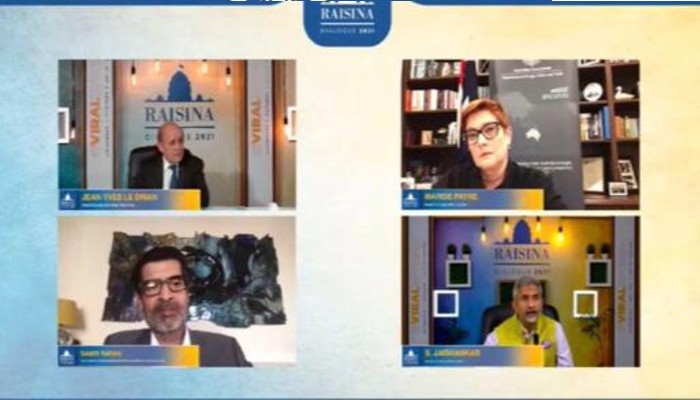The coming together of India, Australia, Japan and the US as the Quad was not aimed at any country, Jaishankar said
External Affairs Minister S Jaishankar on Wednesday made it clear that no country can have a veto on India’s participation in groupings such as the Quadrilateral Security Dialogue or Quad.
“Indo-Pacific is a clear message that India will not be constrained between the Malacca Straits and Gulf of Aden. Our interests, our influence, our activities today go way beyond,” Jaishankar said in his remarks at the Rasina Dialogue which was participated by French Foreign Minister Jean-Yves Le Drian and Australian Foreign Minister Marise Payne.
“When we look at a larger canvas, we see Australia there, France is very much a part of this canvas, historically, culturally, physically. There are a range of activities and projects on which we can all work together,” Jaishankar said, adding the three countries are comfortable working together.
Le Drian reiterated France’s legitimate role in the Indo-Pacific by pointing to the two million French inhabitants in the region, while Payne noted the three countries have come together to work on issues such as pandemic response, vaccine distribution and economic challenges triggered by the Covid-19 crisis.
The coming together of India, Australia, Japan and the US as the Quad or the creation of a trilateral by India, Australia and France is not aimed at any country, Jaishankar said.
Without naming anyone, he described the use of terms such as “Asian NATO” as a “mind game”.
“The idea that somehow because we come together, there is some sort of threat or messaging to others – I think people need to get over this. Using words like Asian NATO etc, this is a sort of mind game which people are playing. I can’t have other people sort of have a veto about what I’m going to discuss, with whom I’m going to discuss,” he said.
Russian foreign minister Sergey Lavrov used the term “Asian NATO” in the context of emerging alliances in Asia at a joint news conference with Jaishankar in New Delhi on April 6.
Hours before the virtual discussion at the Raisina Dialogue, Russian ambassador to India Nikolay Kudashev had reiterated Moscow’s criticism of the Indo-Pacific strategy, saying it was aimed at reviving Cold War-era structures. “Indo-Pacific is a return to history; it reflects a more contemporary world. It is actually overcoming the Cold War, not reinforcing it,” he said.
 Contact Us
Contact Us  Subscribe Us
Subscribe Us









 Contact Us
Contact Us
 Subscribe
Subscribe
 News Letter
News Letter

